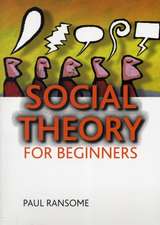Group Behaviour and Development: Is the Market Destroying Cooperation?: WIDER Studies in Development Economics
Editat de Judith Heyer, Frances Stewart, Rosemary Thorpen Limba Engleză Paperback – 19 sep 2002
| Toate formatele și edițiile | Preț | Express |
|---|---|---|
| Paperback (1) | 329.58 lei 31-37 zile | |
| OUP OXFORD – 19 sep 2002 | 329.58 lei 31-37 zile | |
| Hardback (1) | 674.58 lei 31-37 zile | |
| OUP OXFORD – 19 sep 2002 | 674.58 lei 31-37 zile |
Din seria WIDER Studies in Development Economics
- 30%
 Preț: 504.34 lei
Preț: 504.34 lei - 26%
 Preț: 733.49 lei
Preț: 733.49 lei - 30%
 Preț: 597.88 lei
Preț: 597.88 lei - 17%
 Preț: 594.16 lei
Preț: 594.16 lei - 7%
 Preț: 159.68 lei
Preț: 159.68 lei - 13%
 Preț: 737.02 lei
Preț: 737.02 lei - 17%
 Preț: 583.39 lei
Preț: 583.39 lei - 28%
 Preț: 473.92 lei
Preț: 473.92 lei - 30%
 Preț: 501.49 lei
Preț: 501.49 lei - 30%
 Preț: 724.70 lei
Preț: 724.70 lei - 30%
 Preț: 748.64 lei
Preț: 748.64 lei - 31%
 Preț: 434.64 lei
Preț: 434.64 lei - 18%
 Preț: 333.97 lei
Preț: 333.97 lei - 34%
 Preț: 848.58 lei
Preț: 848.58 lei - 34%
 Preț: 847.76 lei
Preț: 847.76 lei - 34%
 Preț: 803.83 lei
Preț: 803.83 lei - 34%
 Preț: 954.23 lei
Preț: 954.23 lei - 34%
 Preț: 892.48 lei
Preț: 892.48 lei - 22%
 Preț: 188.78 lei
Preț: 188.78 lei - 30%
 Preț: 617.12 lei
Preț: 617.12 lei - 18%
 Preț: 334.18 lei
Preț: 334.18 lei - 27%
 Preț: 378.41 lei
Preț: 378.41 lei - 34%
 Preț: 1039.04 lei
Preț: 1039.04 lei - 34%
 Preț: 1043.37 lei
Preț: 1043.37 lei - 34%
 Preț: 1292.22 lei
Preț: 1292.22 lei - 23%
 Preț: 1213.11 lei
Preț: 1213.11 lei - 34%
 Preț: 879.41 lei
Preț: 879.41 lei - 19%
 Preț: 652.21 lei
Preț: 652.21 lei - 34%
 Preț: 1039.15 lei
Preț: 1039.15 lei - 34%
 Preț: 892.84 lei
Preț: 892.84 lei - 27%
 Preț: 443.57 lei
Preț: 443.57 lei - 22%
 Preț: 526.67 lei
Preț: 526.67 lei - 30%
 Preț: 913.24 lei
Preț: 913.24 lei - 34%
 Preț: 997.55 lei
Preț: 997.55 lei - 31%
 Preț: 396.19 lei
Preț: 396.19 lei - 17%
 Preț: 413.16 lei
Preț: 413.16 lei - 34%
 Preț: 1188.13 lei
Preț: 1188.13 lei - 34%
 Preț: 817.30 lei
Preț: 817.30 lei - 30%
 Preț: 1012.76 lei
Preț: 1012.76 lei - 7%
 Preț: 360.77 lei
Preț: 360.77 lei - 31%
 Preț: 447.33 lei
Preț: 447.33 lei - 27%
 Preț: 1295.58 lei
Preț: 1295.58 lei - 31%
 Preț: 441.21 lei
Preț: 441.21 lei
Preț: 329.58 lei
Preț vechi: 451.99 lei
-27% Nou
Puncte Express: 494
Preț estimativ în valută:
63.06€ • 66.02$ • 52.18£
63.06€ • 66.02$ • 52.18£
Carte tipărită la comandă
Livrare economică 27 martie-02 aprilie
Preluare comenzi: 021 569.72.76
Specificații
ISBN-13: 9780199256921
ISBN-10: 0199256926
Pagini: 384
Ilustrații: numerous tables and figures
Dimensiuni: 156 x 234 x 21 mm
Greutate: 0.56 kg
Editura: OUP OXFORD
Colecția OUP Oxford
Seria WIDER Studies in Development Economics
Locul publicării:Oxford, United Kingdom
ISBN-10: 0199256926
Pagini: 384
Ilustrații: numerous tables and figures
Dimensiuni: 156 x 234 x 21 mm
Greutate: 0.56 kg
Editura: OUP OXFORD
Colecția OUP Oxford
Seria WIDER Studies in Development Economics
Locul publicării:Oxford, United Kingdom
Recenzii
... an exceptionally useful resource for practitioners and researchers interested in collective action issues.
The timeliness of the volume can hardly be overstated ... The book's importance lies in its original choice of analytical framework, and its principal conclusions.
The timeliness of the volume can hardly be overstated ... The book's importance lies in its original choice of analytical framework, and its principal conclusions.
Notă biografică
Judith Heyer has worked on different aspects of rural development in Kenya and in Tropical Africa. Her work on Kenya has included work on agricultural policy issues related to production and marketing, food policy, and poverty. She has also worked on villages in South India with a special interest in gender, caste, and class. She has been a Fellow and Tutor in Economics at Somerville, and University Lecturer at Oxford University since 1975. and before that lectured at the University of Nairobi, Kenya.Frances Stewart is Professor of Development Economics and Director of the International Development Centre, University of Oxford and a fellow of Somerville College. Her major research interests concern the impact of development processes on poor people. She has worked on appropriate technology, basic needs and the impact of adjustment policies on poverty. Recent work has focussed on the economic and social causes and consequences of large scale violent conflict, as well as on group behaviour.Rosemary Thorp has been the Lecturer in the Economics of Latin America at the University of Oxford since 1971. Before that she taught at the University of California, Berkeley. Her research has been in the field of economic history of Latin America and the macro economic management problems of that continent. She has worked extensively on Peru, Chile, and Colombia.















